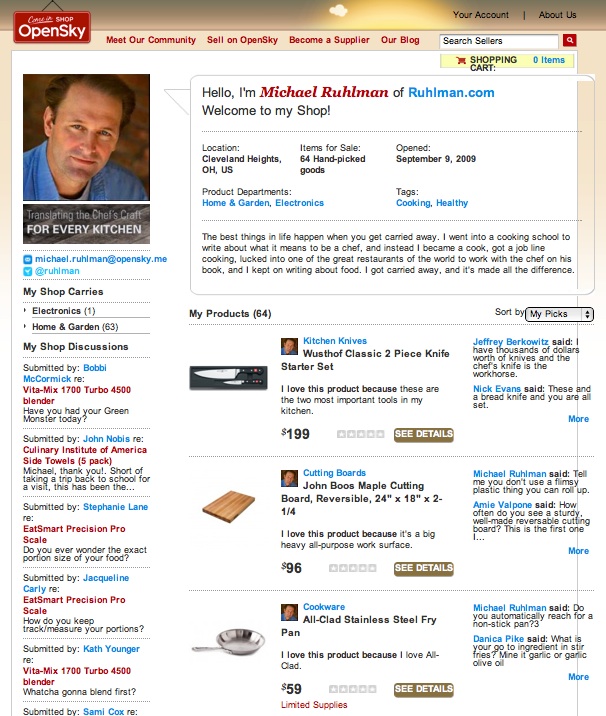
Any good blogger or “influencer” is a natural salesman, but what he or she sells (typically) are ideas or a lifestyle, not actual goods. John Caplan, the CEO of OpenSky, thinks he can turn influencers with a loyal audience into sellers without necessarily selling out. “Why aren’t we buying goods from the people we like and respect?” he asks, bemoaning the impersonal and distant relationships we have with online merchants.
But there are plenty of bloggers and writers who pretty much all they do is recommend products and services. Food bloggers, beauty bloggers, fashion bloggers, design bloggers, health bloggers, sports bloggers, you name it. Pretty much any kind of advice that could once be found in a women’s or men’s magazine can now be found online, and many of them have small but loyal audiences. The only way they can make money from their influence is through ads or affiliate networks or underhanded pay-per-posts.
Caplan, who previously was the president of About.com and then CEO of Ford Models, thinks he’s found a better way. He raised a $5 million Series A in May 2009 from Highland Capital, Canaan Partners and Ron Conway. OpenSky helps bloggers like Kath Younger of KathEats, chef Michael Ruhlman, and Marta Wohrle of Truth In Aging set up stores with products that they recommend and get a cut of each sale. “Ecommerce revenue is catching up with ad revenue and is on track to exceed it this year,” reports Wohrle, who reviews cosmetics and “anti-aging” products.
While OpenSky sounds at first like an affiliate network, it isn’t. Instead of sending customers off to other online stores, they send them to their own stores where they can track sales and follow up with personalized messages. OpenSky hand picks the publishers who are allowed to set up shops and sell in its network. It then strikes deals directly with manufacturers and distributors who agree to drop-ship any sold items to readers who click to buy through an OpenSky shop. Instead of the blogger getting a 3 to 10 percent affiliate fee, they split the net profits 50/50 with OpenSky. The economics work best obviously with high-margin products.
There are 250 publishers currently in OpenSky’s private beta and 500 manufacturers. Publishers only get paid when somebody actually buys a product, and if it is returned within a year they get a debit on their account. The system is set up to reward selling stuff you really care and know about. “We sell things that I love and are often hard to get hold of,” says Wohrle. “My newsletter subscribers get a discount and we work really hard with the manufacturers to get good deals exclusively for us.” (You can check out her store here).
But isn’t this just hucksterism by another name? Inevitably there will be a lot of that as OpenSky itself opens up to more and more seller-bloggers. OpenSky works with Twitter and Facebook too, where it becomes more of a hard sell. But what OpenSky has going for it is that everything is, well, out in the open. There is no question of whether a brand or manufacturer paid for a post or gave influential bloggers free products. The bloggers are selling the products themselves and readers can make their own judgements about whether or not they are hucksters or genuine. The hucksters will lose their audience (and their souls). The authentic ones will grow their audience and get rich telling them what to buy.
Or at least that’s the story John Caplan is selling.

